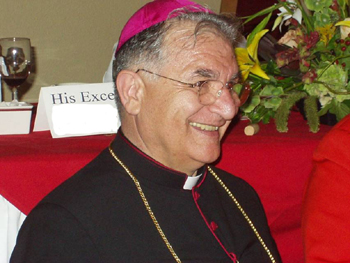CONTEMPORARY CHALDEANS
AND ASSYRIANS

ONE
PRIMORDIAL NATION
ONE
ORIGINAL CHURCH


By: Mar Sarhad Jammo, Ph.D.
Bishop of the Western United States
in Detroit, Michigan, USA.
Origin of the name: The name
“Chaldea, Kaldu, Chaldean, Chaldeans” appeared in history
documents around 900 B.C. Then, we find the Chaldeans first as
Aramean tribes in the neighborhood of
Babylon, later they conquered Babylon itself in 625 B.C.
establishing a splendid empire, until its collapse in 539 B.C.
at the hand of Cyrus the Persian. The Chaldean empire was the
last and most glorious expression of national identity for the
people of ancient Mesopotamia that is before falling under the
rule of foreign Powers.
The fact of having Aramaic speaking peoples in North
Mesopotamia and Syria, on the one hand, and in South Mesopotamia,
on the other, shows that the Aramaic language originated in the
northwestern bank of Euphrates in parallel to the Akkadian
language that originated in the southeastern bank of Euphrates.
In fact, the Chaldeans are mentioned in the book of Job (1, 17)
as somewhere close to the residence of Job himself in 'Aws.
In 627 B.C., Nabupalassar with the help of Chaldean tribes
became king of Babylon, declared independence from Assyria, and
allied himself with the Medees, causing the
collapse of the Assyrian empire
and the fall of Nineveh in 612 B.C., and then he expanded the
rule of Babylon over all of Mesopotamia and beyond.
Nabu-kadh-nassar (604-562 B.C.).
The son of Nabupallasar became Chaldean King of Babylon. with
him Mesopotamia:
1) Reached the peak of its
greatness and glory; Babylon, its capital was recognized as “the
pearl of kingdoms. The jewel and boast of Chaldeans" (Isaia, 13,
19), and was proclaimed as "a golden cup in the Lord's hand that
made all the earth drunken. The nations have drunken of her wine;
therefore the nations are mad" (Jeremiah 51,7).
2) The
Chaldeans, being an Aramaic people, became a
major factor for the spread of Aramaic language and its Alphabet
among the peoples of Near East, including their Hebrew captives
from Judea.
About the Author:
Bishop Sarhad Jammo was born in Baghdad in 1941. He was ordained
a priest in Rome in 1964. He was the Rector of the Patriarchal
Seminary in Baghdad from 1974-1977. Bishop Jammo has served the
Chaldean catholic community in Michigan since 1977. In 1983, he
was assigned to be pastor of St. Joseph Chaldeans catholic
Church in Troy, Michigan. Bishop Jammo has served as Vicar
General of the Chaldean Diocese in the USA from 1991 till in
Detroit, Michigan on July 18, 2002. In 1993 he was appointed
Professor of Eastern Liturgies at the Pontifical Oriental
Institute in Rome.